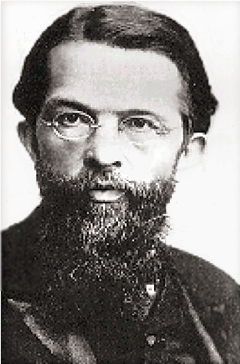
The “marginal revolution” in economics is usually linked to three men: Carl Menger, Léon Walras, and William Stanley Jevons, who wrote on the concept of marginal utility nearly simultaneously in the early 1870s. In 1871, the Austrian economist Carl Menger published his Principles of Economics [Grundsätze der Volkswirtschaftslehre]), While the term “marginal utility” came from Friedrich von Wieser (another “first-generation” Austrian), marginality had been anticipated by some earlier thinkers, notably Jules Dupuit (1804-1866).
Dupuit, a French engineer, wrote in 1844 that each consumer “attaches a different utility to the same object according to the quantity he can consume.” Dupuit’s work was not recognized for its insight until much later. Ekelund and Hebert (A History of Economic Theory and Method, 5th ed.) contend that this might have been because, as an engineer, his primary field was outside of economics–and “intellectual arrogance and myopia” (p. 287) among professional economists meant that Dupuit’s development needed to be rediscovered several decades later. A valuable lesson for economists, then, might be the importance of intellectual humility. The insights of the past can illuminate our future, and the errors of the past are often repeated. I am reminded of a verse from Ecclesiastes: “Is there a thing of which it is said, ‘See, this is new’? It has been already in the ages before us.”
Menger, Walras, and Jevons have been sometimes treated as interchangeable in their thinking about marginalism–and when they are not, Menger is often deprecated as unsophisticated, because his marginal theory did not employ mathematics. But, as Mateusz Machaj has explained,
Menger’s so-called weakness is actually his strength, because it adds a more fruitful dimension to marginal theory, which was completely absent in the mathematical approaches of Jevons and Walras. Even though all three economists are seen as referring to ‘marginal units,’ in Menger, this concept means something other than what it does in Jevons and Walras. In the case of Jevons and Walras, marginal units are infinitely small, continuous, and in consequence almost irrelevant. …In the case of Menger, ‘marginal’ units are something else. They are finite and discrete, not continuous, and therefore it is not part of some broader already-existing utility function which can be maximized with the use of derivatives….
Mateusz Machaj, “Carl Menger’s Revolution”
Machaj goes on to show that this had lasting impact on how Menger’s intellectual descendants saw economics. While the Walrasian and Jevonsian mathematizers went on to dismiss the role of individual decisionmaking–of human action, the Austrians emphasized the importance of individuals who placed value on marginal choices.
This did not mean, by the way, that Menger and his followers in the Austrian School rejected mathematics per se. Menger, who referred to his approach as the “empirical method,” as opposed to Walras’s “rational method,” insisted on tying the use of mathematics to causal explanations and individual preferences. For more on the methodological distinctions between Menger and the other marginalists, see Peter Klein’s “Menger the Empiricist.”
